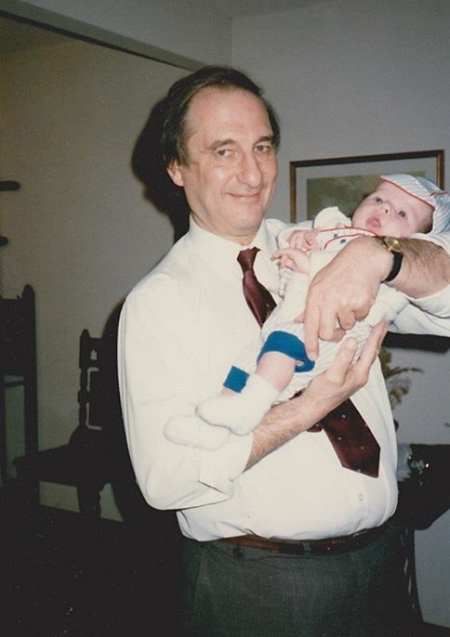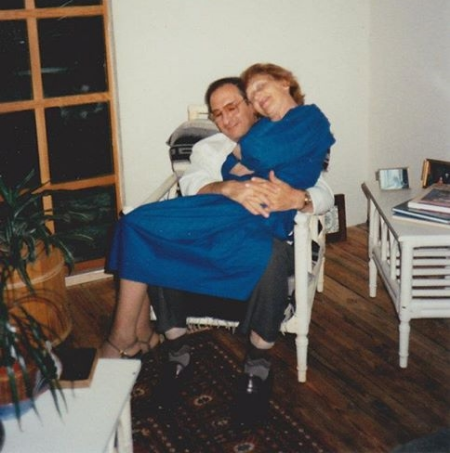
Harry holding Peter (Livingston)

Harry and Olive
In 1988, Harry’s mother passed away. She was 94. So six of us flew to England for the funeral. Julia was the only one to stay, as Peter was only two years old, and she looked after Deborah and Larry’s children. So, Larry, Deborah, David, little Jonathan who was six, and Peter, Harry, and I went. Reggie, Harry’s brother, put us up. We spent most of the week doing all the sights in London. Everyone over there said, “What is wrong with Harry, he looks ill.”
Harry began to have tests at Virginia Mason hospital. He was beginning to get really sick – so yellow looking, and so tired. His doctor said he had liver disease, and so did a biopsy on his liver. The doctor said he had cirrhosis of the liver and asked if he had thought of having a liver transplant. He asked, “Do you have $200,000?” Harry was told he had six months to live. It was traumatic. He was sixty on August 16th. The people in the insurance office at Boeing said he had to leave before his birthday, which was on the very next Monday, in order to qualify for insurance. So, on the Friday before he went to the insurance office in Everett, and on Saturday morning had to go tell his boss. Two or three men cried. He gradually got weaker and was in and out of the hospital. The expense at Virginia Mason was so high that we changed hospitals to Swedish.
At the time he went into Swedish Hospital he was told that he had twelve days to live. All the men from the church came and anointed him with oil.
While changing hospitals we also had to change doctors. We had never met Dr. Smith at Swedish, but he happened to be down in the doctor’s lounge on the phone to Harry’s old doctor and the two of them decided to let him die. Meanwhile, in the lounge was Dr. Howard Kellogg. He himself had, one year before, had a liver transplant. He asked Dr. Smith if he could come up and see us. We expected someone sickly, but instead this tall, virile man came into the room. He asked if we had ever thought of a liver transplant. He was recruiting to try and get liver transplants done at Swedish Hospital, but they eventually opened a unit at the U.W. He had had his transplant in Pittsburgh, where the most important doctor was, Dr. Thomas Starzl. Well, within 24 hours, we flew to Pittsburgh, on March 31st. Larry, Deborah’s husband, managed to get Boeing insurance to let us go. Deborah and Larry flew with us. There was an ambulance waiting for us at the airport. We arrived at 10 p.m.
After settling Harry in, we finally got to our hotel at 1 a.m. While walking from the hospital to the hotel, a jogger came by. Deborah asked him where the University Hotel was. He asked what we were doing there. We all thought, “What a strange thing to say.” So Deborah said, “My father is here for a liver transplant,” and then she said, “Who are you?” He said, “I am one of the team.” She said, “What is your name?” He said, “Dr. Thomas Starzl.” We found out later that he went back to the hospital and pulled Harry’s file out and put him on top of the waiting list. There were only six people on the list. We really thought he was going to die. He began bleeding all over his chest and bringing up big lumps of blood. Deborah and Larry stayed with him. The third night Larry took me back to a little bed sitter we had rented.
Meanwhile, Peter decided to come, and flew all night. Harry had gone into a coma, so he was put into intensive care. We had contacted a church, the name of which we had been given, and several of the men came to help us. One of them was John Munro. He was from Edinburgh and had a lovely accent. We had been given two verses at Swedish Hospital by a man we did not know or had not met. It was Psalm 91, and verses 15 and 16 were the most important. John met Harry the first day before he went into a coma, and said, “Harry I will read you a wee Psalm.”It was Psalm 91. It made the hair on our necks stand up as we had thought the first verses were from an angel.
The next morning, David and Kristi arrived. A man from one of the churches, David Good, picked them up from the airport. Inside the hospital, when someone was in intensive care, they only allowed visits for ten minutes every hour. So, there was this big room with lots of strangers bonded together, because their loved ones were there for heart, liver and kidney transplants. When Peter and I went up the stairs to intensive care, my legs were so weak. Intensive care was a large circle with about eight beds. Each bed had a nurse sitting at the foot of the bed, and one other nurse between two beds. It had a central place with doctors and nurses inside. There was a lot of humming noise, because each patient had so many computers, wires and pipes going into them.
The first time Peter and I saw Harry (this was before the transplant), he had a metal plate on his face, with a big tube down his throat, and tubes coming out from everywhere. I fainted. David and Kristi had arrived. Both broke down and cried. It was a very emotional time. That night all six of us stayed at the studio apartment. Larry and Deborah had the put-you-up, Kristi and I had the two twin beds, and Peter and David slept on the floor. It was a marvelous comfort to have them all there.
Julia had to stay home. Rebecca had been nine weeks premature, and was only two and a half months old. So, Julia looked after Deborah’s children.
We found this nice little coffee shop in the hospital, and we would all have breakfast there. Larry was a great help. He scrubbed the bathroom and kitchen in the apartment to make sure it was clean. It was about a mile from the hospital. The weather wasn’t too bad, but sometimes we got a bus or taxi.
